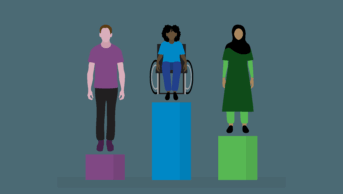
Wes Mountain/The Pharmaceutical Journal
In the race to provide patients with earlier access to life-saving medicines, taking the route of compassionate use schemes is fraught with risk, but undeniably worth it.
Medicines provided by pharmaceutical companies through these schemes offer patients a last hope in their fight against an otherwise life-threatening illness. Compassionate use medicines legally cannot be offered where other licensed alternatives could be used instead.
The most recent success story for these schemes can be found in patients with type 1 spinal muscular atrophy (SMA) — the most severe form of the genetic disease — which can leave infants struggling to breathe on their own. Data published by NHS England in August 2023 from the national SMA Research and Clinical Hub UK database show that 73% of children with type 1 SMA have exceeded the age of two years thanks to treatments that have only been accessible to patients since 2019. Nusinersen was approved for use on the NHS in 2019, with Zolgensma and risdiplam following in 2021.
Before these medicines were made available, just 8% of babies born with the disease survived to the age of 20 months without permanent ventilatory support. The disease is very rare. According to the latest prevalency data published by the government, one baby is born with type 1 SMA in every 16,350 births. But for the families affected, access to medicines like nusinersen (Spinraza), an antisense oligonucleotide that was first supplied through an independent compassionate use scheme offered by Biogen, is a matter of life and death.
As invaluable as these schemes may be though, they can present significant problems when it comes to patient access.
A crucial detail left out of NHS England’s SMA success story was that the inequity of access to nusinersen, in particular, forced some families to spend “enormous” amounts of money on travelling abroad for treatment. More generally, pharmaceutical companies have noted that requests for medicines for compassionate use are more likely to come from large teaching hospitals and academic centres.
If the NHS is serious about reducing unwarranted variation, as its guidelines suggest, why stop short of facilitating greater information sharing about compassionate use schemes at a national level?
Quantifying the scale of this inequity has proven difficult. A freedom of information request sent by The Pharmaceutical Journal to all acute trusts in England in April 2023 revealed that more than half (55%) do not have a centralised database keeping track of the compassionate use schemes that they have accessed, leaving them unable to say how many patients they have treated with compassionate use medicines.
The result is a dearth of information where there should be plenty — at least for safety’s sake.
By definition, to be offered in this way, compassionate use medicines have not passed through the usual checks that guarantee safety and efficacy.
Researchers at University College London Hospital, who reviewed the schemes offered by their own trust over a seven-year period, found that fewer than half (44%) of the schemes offered by manufacturers independently of any regulatory body were backed by phase III clinical trials. Their data showed that 37% had phase II clinical trial data, while just under a fifth (19%) of the schemes used were only supported by phase I data, retrospective observational studies or preclinical data.
As the researchers note, early clinical trials may have small sample sizes that fail to detect serious adverse effects, calling into question whether the risks of offering these unlicensed medicines might outweigh the benefits.
It is calculating this risk that saddles trusts with a substantial amount of due diligence and paperwork before being able to offer medicines this way.
NHS England guidance on accessing these schemes sets out two beneficiaries — patients with an unmet clinical need and those who had experienced benefits during a clinical trial — before listing 12 risks that trusts should consider ahead of provision and an 18-point form that they should complete before approving the treatments for use. The guidance advises trusts to develop a standard operating procedure and “to assess each scheme for suitability prior to signing up”.
The schemes themselves are not standardised between companies so it becomes a high-level operation — involving everyone from the trust’s chief medical officer, the pharmacy team and the consultant looking after the patient — for every single compassionate use medicine.
The workload and risk involved here undoubtedly prohibits smaller trusts from signing up. In some cases, these trusts simply may not be aware that certain schemes are taking place.
The Association of the British Pharmaceutical Industry has told The Pharmaceutical Journal that it “would welcome working with the NHS to help make the processes for communicating, evaluating, and implementing such schemes more efficient and consistent to allow more patients to benefit”.
Now there is an opportunity for NHS England to step up. Through the likes of its Rightcare programme, the NHS has been advocating information sharing between hospital trusts as a means for improving patient care for years. If the NHS is serious about reducing unwarranted variation, as its guidelines suggest, why stop short of facilitating greater information sharing about compassionate use schemes at a national level? The data and knowledge gathered by well-resourced trusts, which is likely requested by the pharmaceutical company already, could then be shared and used by other trusts elsewhere in the country.
As the oncology team at the Christie NHS Foundation Trust wrote in October 2022, it is “morally right” to provide compassionate use medicines to patients, not leave them at the mercy of luck. Surely then, this moral duty ultimately rests with the NHS as a whole. PJ


